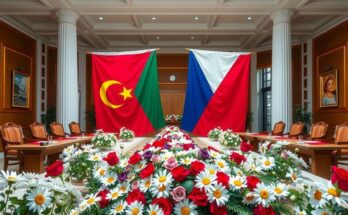Angola will host direct peace talks between the Democratic Republic of Congo and M23 rebels on March 18. The Congolese government has acknowledged the invitation from Angola. The situation in eastern DRC is dire, with significant humanitarian crises stemming from the ongoing conflict since January. The involvement of multiple regional powers raises the stakes, potentially leading to broader regional instability.
On March 18, direct peace talks between the Democratic Republic of Congo and M23 rebels are scheduled to commence in Luanda, according to a statement by Angola’s presidency. The Congolese government has acknowledged receipt of the invitation but has not confirmed its participation. Angola has been working towards a ceasefire to mitigate tensions between the DRC and neighboring Rwanda, which reportedly supports the M23 group, a claim Rwanda denies.
Despite initially refusing to engage in direct discussions with the M23, the Congolese government has recognized Angola’s mediation efforts. Angola has expressed its commitment to initiate dialogue in hopes of resolving ongoing conflicts stemming from the complicated historical relationship between Congo and Rwanda. M23 leader Bertrand Bisimwa has publicly stated that negotiations are essential to address the escalating crisis.
In tandem with these developments, an extraordinary summit of Southern African Development Community (SADC) heads of state is scheduled to address the situation in eastern DRC. This summit, chaired by Zimbabwean President Emmerson Mnangagwa, will discuss the roles of regional armed forces currently deployed in the area, where M23 rebels have gained significant control.
The conflict’s origins trace back to the fallout from Rwanda’s 1994 genocide and are exacerbated by competition for Congo’s valuable mineral resources. Recent reports indicate that the fighting has resulted in over 7,000 deaths since January and displaced approximately 600,000 individuals since November, according to the UN.
Human Rights Watch has raised alarms about human rights violations occurring in M23-controlled regions, highlighting the harassment and assassination of civil society activists and journalists. This troubling trend reflects a broader issue of deteriorating civic space under M23 influence in North and South Kivu provinces.
Regional military activity has escalated, with multiple countries, including Burundi and Uganda, deploying troops into eastern DRC, raising concerns of a potential resurgence of violence akin to the Congo wars of past decades. Observers fear that failure to address the conflict may lead to widespread instability throughout the region.
In summary, Angola is facilitating an important dialogue aimed at resolving the long-standing conflict between the DRC and the M23 rebels. The situation remains critical, with significant humanitarian crises and regional military implications. Continued monitoring and involvement of international parties may be necessary to ensure peace and stability in the region, as tensions persist and human rights issues arise.
Original Source: www.rfi.fr




